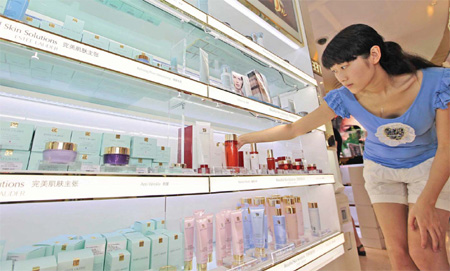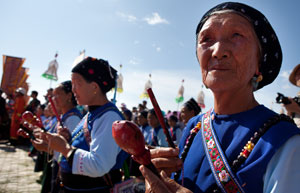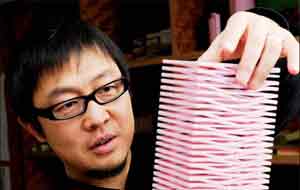A lighter shade of pale
Updated: 2011-09-23 08:39
By Zhang Xi (China Daily)
|
|||||||||
|
|
Chinese consumers are obsessed with white skin, offering cosmetics companies a lucrative sector
While in the West tanned complexions represent youth and beauty, pale, white skin is the hallmark of glamorous Chinese women. This deep-rooted ideal has been the driver of the skin-whitening business.
"Get white" messages are inescapable in this part of the world. Ghostly, white faces fill the scenes of popular Chinese TV dramas. Pale Chinese models peer from the pages of glossy magazines, pout on billboards and in cinema advertisements. And pamphlets with bleached faces jostle for counter space at local department stores.
|
||||
"This obsession with whiteness has not faded over time. A white complexion was seen as noble and aristocratic, especially in southern parts of China and Asia, where the sun was always out. Only those rich enough could afford to stay indoors, while peasants baked in the rice fields," Li says.
That trend seems to continue today. Advertisements of skin-whitening products usually promise a more desirable you if the right products are used. A darker girl is portrayed as dowdy, awkward and plain. After applying skincare products, the skin color gradually becomes lighter and lighter, and, in the process, the ugly duckling transforms into a pale swan.
Dale Preston, managing director of retail measurement for consultant Nielsen Greater China, says whitening products are the key segment of the skin care market in China. It makes up nearly 30 percent of the total skin care market in China. Chinese consumers are big users of facial whitening products, with facial care accounting for more than 80 percent of market.
Euromonitor International, another independent strategy research company, indicated China's market for whitening products is expected to grow. In its report released this year, L'Oreal was the clear leader in skin care in China in 2010, accounting for 16 percent overall value share.
Annualsales of L'Oreal China broke the 1 billion euros ($1.35 billion) mark for the first time in 2010, becoming the French cosmetics company's third largest market in the world with double-digit growth for the 10th consecutive year. L'Oreal achieved sales of 1.01 billion euros in China last year, an increase of 17.6 percent.
According to Bao Yanyue, general manager of L'Oreal Paris in China, the group's biggest and best-established brand, it has 13 skin-whitening products in the Chinese market, ranging from facial cleansers to facial masks.
"Women at every age want to bleach their skin. We offer products priced from 100 yuan (11.45 euros) to 220 yuan to help them reach their goals. Since fairness is the specific requirement of Asian women, these kinds of products are only available in this area. But we do believe skin whitening will retain its very important position here," she says.
The skin care business is good for Estee Lauder as well. For the fiscal year ending June 30 in the Asia-Pacific market, net sales were $1.76 billion this year, with $1.51 billion last year. The strongest gains were generated in China, Korea and Singapore, primarily reflecting strong sales of skin care products.
Clinique, one of its brands, sells 15 skin-whitening products in China. "Women between the ages of 25 to 40 are our core customers, and they are more worried about whether skin-whitening products will cause dry or even sensitive skin," says Hedi Li, assistant public relations manager for its China division.
As cosmetic giants around the world have jumped into the lucrative Chinese obsession, domestic brands have also performed well during the past 12 months.
Preston, from Nielsen, says comparing with the year before, domestic facial moisturizing whitening products grew 93 percent, and domestic facial cleansing whitening products grew 79 percent from August 2010 to July. Local firms have put effort into innovation and trying to provide consumers with high-end products.
Shanghai Jahwa, the first listed company in the domestic cosmetics industry, has distributed its products to 200 cities that have at least 1 million people through its extensive sales network. It recorded profits of 302 million yuan in 2010, an increase of 2.65 percent from 2009.
Herboist, on of its brands, has 13 skin-whitening products and will launch two or three new products by the end of the year. Herboist accounts for about 3 percent of the skin-whitening market and predicts it could reach 4 percent this year.
Wu Fan, vice-general manager of the brand, says Herboist's skin-whitening products contain traditional Chinese medicine, which gives it an advantage over Western brands.
Other traditional Chinese medicine ingredients could be added to future skin-whitening products. Scientists have discovered cinnamomum subavenium, an evergreen bush. It has active ingredients in an herb that is used in traditional Chinese medicine, which can be used for skin whitening. The findings were reported at the 241st National Meeting & Exposition of the American Chemical Society in March.
The herb, according to the researchers, appears to be safer than whitening creams. It is a close relative of the cinnamon tree and contains two chemicals that are able to block tyrosinase, which generates melanin.
Hui-Min Wang, a scientist at Kaohsiung Medical University in Taiwan, said the herb is a safer alternative, because some products on the market contain potentially toxic substances that can cause itching, redness and inflammation.
The next step for Hui-Min is clinic trials, as hordes of women across China continue to slap on whitening lotions to bleach their skin. Skin-whitening products have flooded the market and are available everywhere.
"Sometimes I am really frustrated by which skin-whitening product to choose; there are so many. The best way may be listening to my colleagues' suggestions," says Fiona Yu, a 29-year-old teacher in Beijing. "Some of them (my colleagues) buy products after watching the advertisements on TV, while others are checking online stores to see which products are in vogue."
Taobao, China's largest online shopping website, contains numerous stores selling skin care products. Though there are many listings showing so-called top ten skin-whitening products on Taobao, the website has denied any such rankings. But it can't stop customers' passions to buy tens of thousands of skin whitening products a month.
"While my friends buy various brands, some others want an immediate brightening effect, so they opt to visit beauty salons," Yu says. "Those salons often provide products made by themselves, which can't be found on the market. They may have a special impact."
However, applying products made by beauty salons could be risky.
Huashan Hospital, affiliated to Shanghai Fudan University, is a leader in treating skin diseases. In 2007, it surveyed 120 professional women among whom 70 percent often visited beauty salons to apply skin-whitening products.
"Many of these products contain Vitamin A Acid, which causes people's skin to become sensitive under the sun. Some possess too much hormone, making capillary vessels dilatate, causing erythema, or redness," says Zheng Zhizhong, a dermatologist at Huashan Hospital.
But Ma Yue, director of a Beijing branch of Beauty Farm, a nationwide beauty salon chain in China, stands by their products, which are imported from Europe.
"We suggest products for our customers based on the conditions of their skin," Ma said. The most popular whitening service costs 680 yuan a week.
"But if our clients want a very distinctive effect as soon as they step out of our salon, they are advised to try a treatment involving a pigmentation removal machine," which involves lasers.
Elodie Huang, managing director of Asia Insight, a market research firm in Asia, doesn't think many people are turning to machines to brighten one's skin.
"Concerning the issues of sanitation and safety, people are more willing to apply cream or lotions. The selling condition of skin-whitening products in China is stably increasing this year. In the past five years, the growth number has doubled every year," she says.
But consumers of skin-whitening products should remember science is a big part of the alteration of the skin color.
Wu Yan, a dermatologist at the Chinese Medical Doctor Association, says dark skin caused by sun exposure can be lightened with the use of skin-whitening products, but no products can change the natural color of one's skin. That is determined by DNA.
(China Daily 09/23/2011 page10)












